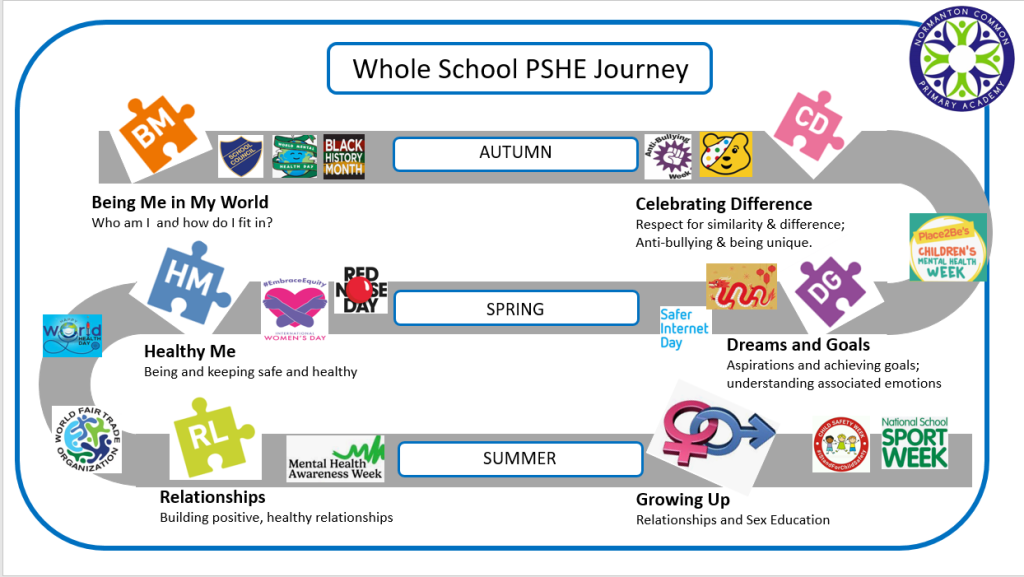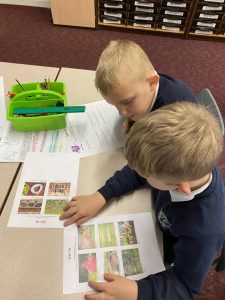Subject Leader : C Walls
All schools must provide a curriculum that is broadly based, balanced and meets the needs of all pupils. Under section 78 of the Education Act 2002 and the Academies Act 2010, a PSHE curriculum:
- Promotes the spiritual, moral, cultural, mental and physical development of pupils at the school and of society, and
- Prepares pupils at the school for the opportunities, responsibilities and experiences of later life.
At Normanton Common Primary Academy School, we teach Personal, Social and Health Education as a whole-school approach to underpin children’s development as people and because we believe that this also supports their learning capacity.
We have adopted the Jigsaw Programme because it offers us a comprehensive, carefully thought-through Scheme of Work which brings consistency and progression to our children’s learning in this vital curriculum area. The programme is designed around the statutory Relationships and Health Education objectives and is aligned to the PSHE Association Programmes of Study for PSHE.
Click on the links below for some useful information about the Jigsaw scheme:
Jigsaw-Information-Leaflet-for-Parents.280064061
Jigsaw-PSED-Early-Learning-Goals.280064061
Jigsaw-RSHE-Overview-Map.280064061
RSHE-Guide-For-Parents.280064061
This also supports the “Personal Development” and “Behaviour and Attitude” aspects required under the Ofsted Inspection Framework, as well as significantly contributing to the school’s Safeguarding and Equality Duties, the Government’s British Values agenda and the SMSC (Spiritual, Moral, Social, Cultural) development opportunities provided for our children.
Our PSHE policy is informed by existing DfE guidance:
- Keeping Children Safe in Education (statutory guidance)
- Respectful School Communities: Self Review and Signposting Tool (a tool to support a whole school approach that promotes respect and discipline)
- Behaviour and Discipline in Schools (advice for schools, including advice for appropriate behaviour between pupils)
- Equality Act 2010 and schools
- SEND code of practice: 0 to 25 years (statutory guidance)
- Alternative Provision (statutory guidance)
- Mental Health and Behaviour in Schools (advice for schools)
- Preventing and Tackling Bullying (advice for schools, including advice on cyberbullying)
- Sexual violence and sexual harassment between children in schools (advice for schools)
- The Equality and Human Rights Commission Advice and Guidance (provides advice on avoiding discrimination in a variety of educational contexts)
- Promoting Fundamental British Values as part of SMSC in schools (guidance for maintained schools on promoting basic important British values as part of pupils’ spiritual, moral, social and cultural (SMSC)
- SMSC requirements for independent schools (guidance for independent schools on how they should support pupils’ spiritual, moral, social and cultural development).
How is the content / theme chosen?
The content is chosen to make effective links with the key themes of the DfE’s Relationships Education and Health Education documents for primary schools. At Normanton Common Primary Academy we ensure a clear, sequenced progression, which is taught systematically for all pupils to acquire the intended knowledge and skills. The content may be adapted or changed, based upon the needs or interests of specific cohorts.
The key aspects of Relationships Education are:
- Families and people who care for me
- Caring Friendships
- Respectful Relationships
- Online Relationships
- Being Safe
The key aspects of Health Education are:
- Mental Health
- Internet Safety and Harms
- Physical Health and Fitness
- Healthy Eating
- Drugs, Alcohol and Tobacco
- Health and Prevention
How do we ensure progression of knowledge and skills?
To ensure progression and a spiral curriculum, we use Jigsaw, as our chosen teaching and learning programme and tailor it to our children’s needs. At Normanton Common Primary Academy we have in place for each subject area, a knowledge and skills progression document, which is used for planning, to ensure sequenced and appropriate content for specfic year groups. Teachers are clear on the learning and expectations for each year group, as this has been carefully selected and mapped out so that children are building on prior knowledge and skills each term and each year. Within these documents there are opportunities for differentiation, in order to meet the needs of all learners.
How is the subject taught?
Whole-school approach
Jigsaw covers all areas of PSHE for the primary phase including statutory Relationships and Health Education. The table below gives the learning theme of each of the six units and these are taught across the school; the learning deepens and broadens every year.
Click on the link below to see an overview of the PSHE Road Map throughout a child’s journey through school.

| Term | Puzzle (Unit) | Content |
| Autumn 1: | Being Me in My World | Includes understanding my own identity and how I fit well in the class, school and global community. Jigsaw Learning Charter established. |
| Autumn 2: | Celebrating Difference | Includes anti-bullying (cyber and homophobic bullying included) and understanding |
| Spring 1: | Dreams and Goals | Includes goal-setting, aspirations, who do I want to become and what would I like to do for work and to contribute to society |
| Spring 2: | Healthy Me | Includes drugs and alcohol education, self-esteem and confidence as well as healthy lifestyle choices, sleep, nutrition, rest and exercise |
| Summer 1: | Relationships | Includes understanding friendship, family and other relationships, conflict resolution and communication skills, bereavement and loss |
| Summer 2: | Growing Up | Includes Relationships and Sex Education in the context of coping positively with change (please refer to our separate Relationships and Sex Education Policy). |
At Normanton Common Primary Academy School we allocate a minimum of 40 minutes each week to the discrete teaching of PSHE, in order to teach the knowledge and skills in a developmental and age-appropriate way.
Class teachers deliver the weekly lessons to their own classes. Our mixed year group classes follow the programme for the younger pupils in their class. However, all pupils are taught age-appropriate objectives for the RSE unit, Growing Up (refer to our Relationships and Sex Education Policy).
| Class 4 | Mixed Year 1 and 2 pupils | Follow Year 1 objectives |
| Class 7 | Mixed Year 3 and 4 pupils | Follow Year 3 objectives |
| Class 10 | Mixed Year 5 and 6 pupils | Follow Year 5 objectives |
At Normanton Common Primary Academy School, there is a strong focus on developing the vocabulary of our children and the retention of this through practical learning opportunities. New vocabulary is taught, with the emphasis on key words and phrases. Although we actively introduce and are ambitious with the language we use, we understand the importance not to over complicate this language with very young children, but ensure underlying principles and meanings of the words are taught and understood.
Children are introduced to and reminded of key vocabulary. Questioning is used to check their understanding and prior knowledge, before new concepts, skills or knowledge are introduced.
Modelling is used by class teachers to clarify expectations, children are then given plentiful opportunities to consolidate, build upon and apply basic skills and knowledge, across a series of lessons, as well as across the year.
When children are learning about a subject through a discrete teaching session they are explicitly told that today they are learning PSHE, which is all about themselves, their relationships, and their health. They are then reminded of the key skills that they will learn, use and develop within this subject.
PSHE is one of our overarching subjects in developing the ‘Challenge & Educate’ side of our school curriculum. Every opportunity is taken to ensure children learn about and are taught to challenge stereotypes connected to gender, wealth, disability and cultural background. They are educated that differences should be celebrated and are not a barrier to achievement.
Our explicit PSHE lessons are reinforced and enhanced in many ways: assemblies and collective worship, praise and reward systems, Learning Charter, through relationships child to child, adult to child and adult to adult across the school. We also make take every opportunity to make links with PSHE objectives in many other subjects across the curriculum, especially Science, PE, RE and Computing. We aim to ‘live’ what is learnt and apply it to everyday situations in the school community.
Teaching PSHE in EYFS
Because the PSED Early Learning Goals are a prime area of learning, children in EYFS are given the opportunity to explore, investigate, question and continually practise and embed their language and learning through the areas of provision set up in the indoor and outdoor learning environments. Planning and teaching of PSHE as a discrete subject, is similar to that in Key Stage 1. The children are expected to develop a specific set of skills and knowledge appropriate to their age. This is often beyond the expectations that are set out in the end of year Early Learning Goals, as we prepare our children with the knowledge and skills they will need, ready for year 1. Lessons are approximately 20 minutes long.
How do we know that our children are making progress?
Ongoing assessments of the children’s knowledge and skills is observed by the class teacher. Misconceptions are addressed and next steps carefully planned. Children’s outcomes are compared to the subject specific skills and knowledge documents. At the end of a block of discrete teaching (or term) subject leaders gather an overview of children’s outcomes in each subject area. This is used to plan appropriate next steps for their future learning, as well as provide an overview of learning within a subject area across the whole school.
End of year assessments are collated for children at the end of EYFS and Key Stage 1 and 2.
Provision and assessment is tailored and adapted for pupils with SEND. This involves making adaptations to the task, group, or working with additional adult support if necessary. We ensure that we will not limit any children with SEND.
How do we promote our Curriculum Intent?
Active Learners
During PSHE, children will have the opportunity to work with partners and groups throughout the year. This will provide them with the necessary tools to be able to improve their independence as well as working collaboratively. Throughout the units of PSHE, children will have the opportunity to discuss, act out and display their skills to their peers. This will ensure pupils are engaged and take pride in their learning. As they move through school, children will be exposed to a variety of different situations and scenarios where they can apply their knowledge and skills.
Active Citizens
Citizenship is a key concept in our PSHE lessons. This theme is developed from the classroom, to our school, to our local community, through to global issues. Children are given the knowledge and skills to understand the importance of being a good citizen, and how they can make a positive contribution. PSHE gives children opportunities to explore and celebrate diversity within their local communities and the wider world, understanding what is ‘right/just’ and what is ‘wrong/unjust’; how and why we care for others and our world and the positive impact that individuals can have. Our lessons include the teaching of the British Values of democracy, rule of law, respect, tolerance and individual liberty.
Active Communicators
In PSHE, children will be exposed to a wide range of vocabulary to help them understand themselves, their bodies, their health and the world around them. Children will have the opportunity to use their oracy skills throughout their lessons, as they work collaboratively with their peers.
What wider opportunities are provided for our children to develop their knowledge and skills?
- Assemblies
- Charities
- School Council and Parliament
- Visits by school nursing team
- Visitors to keep us safe
- Residentials/visits/extra-curricular clubs
- Playtimes and lunchtimes
- Pastoral support
- Eco-council and club
PSHE in action...

